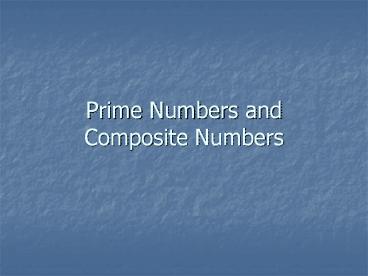Prime Numbers and Composite Numbers - PowerPoint PPT Presentation
1 / 8
Title:
Prime Numbers and Composite Numbers
Description:
Prime Numbers and Composite Numbers Some whole numbers can be divided up evenly, and some can't! Example: 6 can be divided evenly by 2, or by 3: 6 = 2 3 What is ... – PowerPoint PPT presentation
Number of Views:1711
Avg rating:3.0/5.0
Title: Prime Numbers and Composite Numbers
1
Prime Numbers and Composite Numbers
2
Some whole numbers can be divided up evenly, and
some can't!
A number that can not be divided up evenly is a
Prime Number
Example 7 cannot be divided up evenly
A number that can be divided up evenly is a
Composite Number
- Example 6 can be divided evenly by 2, or by 3
6 2 3
or
divided into 2 groups divided into 3 groups
So 6 is Composite, but 7 is Prime.
3
What is a Prime Number ?
- A Prime Number cannot be divided evenly by any
number, except 1 or itself.
- Example is 7 a Prime Number or Composite Number?
- We can of course divide 7 into seven 1s (or one
7) like this - 7 1 x 7
- But we could do that for any whole number! So we
should also say we are not interested in dividing
by 1, or by the number itself. - You cannot divide 7 evenly by 2 (you would get
2 lots of 3, with one left over) - You cannot divide 7 evenly by 3 (you would get
3 lots of 2, with one left over) - You cannot divide 7 evenly by 4, or 5, or 6.
So 7 is a Prime Number
4
What is a Composite Number?
A Composite Number can be divide evenly by
numbers other than 1 or itself.
- Example is 12 a Prime Number or Composite
Number? - You can divide 12 evenly by 1 and 12.
- 1 12 12
- You can divide 12 evenly by 2 and 6 (you would
get 2 lots of 6 or 6 lots of 2). - 2 6 12
- You can divide 12 evenly by 3 and 4 (you would
get 3 lots of 4 or 4 lots of 3). - 3 4 12
- We can divide 12 evenly by 1, 2, 3, 4, 6 and 12
So 12 is also a Composite Number
5
Important points to remember
- Any whole number greater than 1 is either a
Prime number or a Composite number. - 1 is considered neither a prime number nor a
composite number - Remember this is only about Whole Numbers (1,
2, 3, ... etc), not fractions or negative
numbers. - So don't say "I could multiply ½ times 6 to get
3.
6
Examples From 1 to 14
Number Can be evenly divided by Prime, or Composite?
1 (1 is not considered prime or composite) (1 is not considered prime or composite)
2 1, 2 Prime
3 1, 3 Prime
4 1, 2, 4 Composite
5 1, 5 Prime
6 1, 2, 3, 6 Composite
7 1, 7 Prime
8 1, 2, 4, 8 Composite
9 1, 3, 9 Composite
10 1, 2, 5, 10 Composite
11 1, 11 Prime
12 1, 2, 3, 4, 6, 12 Composite
13 1, 13 Prime
15 A question for you is 15 Prime or Composite ? A question for you is 15 Prime or Composite ?
7
Why All the Fuss about Prime and Composite?
Because you can "break apart" Composite Numbers
into Prime Number factors.
It is like the Prime Numbers are the basic
building blocks of all numbers. And the
Composite Numbers are made up of Prime Numbers
multiplied together.
And that is why they are called "Composite"
Numbers because composite means "something made
by combining things
8
This idea is so important it is called The
Fundamental Theorem of Arithmetic.































